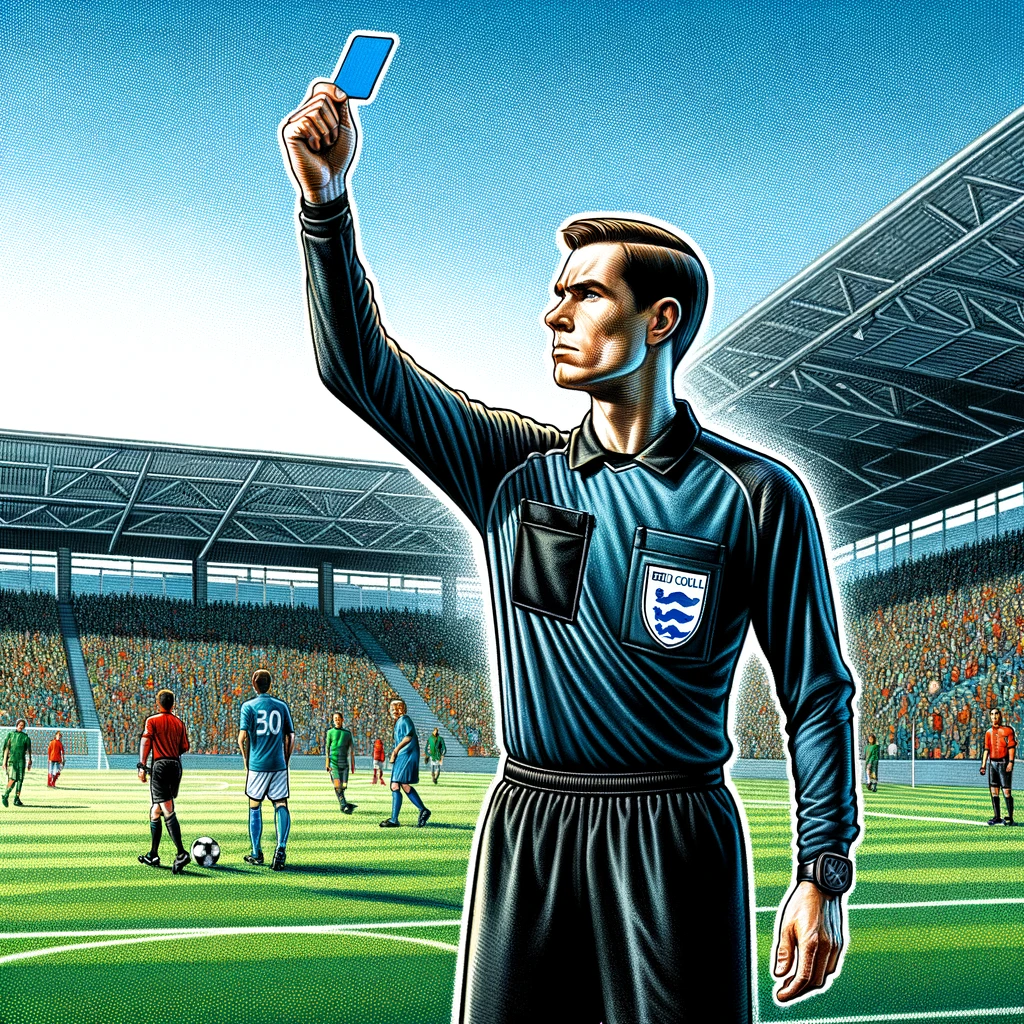Football, the beautiful game, is governed by a set of rules. Refraction of these rules invites punishment for the culprits and by extension their team.
Currently, in-game offenses are punishable by yellow and red cards, the former a caution for an offense not deemed too serious to warrant dismissal. The latter a sending-off offense.
Accumulation of two yellow cards in the same match begets a red card.
An automatic red card carries a mandatory two or three-match ban, while a sending-off for a second yellow card rules the offender out for one match.
In a bid to clamp down further on unsporting conduct, football lawmakers are mulling over the introduction of another card, the blue card, specifically to punish dissent and cynical fouls.
Will the proposal see the light of day?
Blue card in practice
Recipients of the blue card would be ejected from the game and made to sit in the technical area, the sin bin, for 10 minutes.
Two blue cards, or a blue and a yellow card, just like two yellows in the current regime, lead to automatic dismissal.
Upon serving the full 10-minute sin-bin punishment, the player is allowed to re-join the action.
Rationale for punishment
Punishment is meant to be a deterrence. There must also be some form of reparations to the wronged party.
In an ideal world, while a team is shorn of the services of their ejected player, opponents would capitalise on their numerical advantage by scoring a goal or two. That would send the message to the offender and his team that indiscretions have consequences.
The punishment though served by an individual affects the collective. The rest of the team will be forced to pick up the slack for the teammate consigned to the sin bin.
Mutilating the game?
The sin bin, just like VAR, is another innovation copied from rugby, where it has been employed to excellent effect for quite some time.
While football has embraced VAR, early indications are that not many football fans are enamoured with the sin-bin proposal. They believe the game will descend into a farce.
First the game must grapple with definition and interpretation. There would need to be definitional consensus around the range of fouls broadly categorised as cynical fouls and where these are committed on the pitch to warrant the blue card.
How will the game distinguish between the old-fashioned tactical foul, often praised as “taking one for the team” and even encouraged by coaches, and a cynical foul.
Then there is dissent. Dissent can either be verbalized or demonstrated? A player who slams the ball down in anger and frustration at a decision is showing dissent, but is it the same as directing verbal protest at match officials?
In their sole discretion and interpretation, referees will also have to distinguish between a genuinely mistimed tackle punishable by a yellow card and a ‘cynical’ tackle?
There is a real risk of overlap of offenses punishable by yellow and blue cards.
The pros
Players must be on their best behaviour at all times. So reasonable measures to deter unsporting conduct are welcome.
Is the mandatory yellow card sufficient punishment for the schedule of offenses earmarked for punishment by the blue card? Is a free-kick sufficient restitution to a wronged opponent?
Sometimes players are happy to take the yellow card because the benefit of committing such a foul outweighs the punishment. “It’s a good professional foul to give away,” we often hear commentators say.
Sometimes no tangible benefit accrues to the wronged team from the award of a free-kick for a cynical foul. However, if the offender is ejected from the match, the benefit to the other team is immediately realised by tilting the numerical balance.
The Cons
It looks like the issuance of a blue card will not be subject to ratification by VAR. The on-field referee’s decision to send a player to the sin-bin will be therefore be final.
A record 13 yellow cards were shown during the tie between Sheffield United and Tottenham earlier this season. Potentially half of those cautions would qualify as blue card offenses.
Football matches could descend into farce if a whole host of players are sent to the sin bin in quick succession.
That is also likely to affect the quality of a football match as a spectacle and a contest.
Other questions
While there is no indication VAR will be used to review blue cards with a view to rescinding, can it be used to review with a view to upgrading to a red card?
All Blacks captain Sam Cane was sent to the sin bin in the first half of the rugby World Cup final against South Africa this year. He would never return to action after TMO upgraded his yellow card to a red card.
What about dissenting players during substitution?
What would happen if a player is shown a blue card, say, for speaking out of turn as he trudges off the pitch to be substituted? Will the introduction of his replacement be delayed by 10 minutes? Remember a player in the sin bin cannot be substituted.
Blood bin next?
I’m more persuaded by the argument for blood bins than sin bins.
But that’s a discussion for later. Let me not muddy the waters any further.






